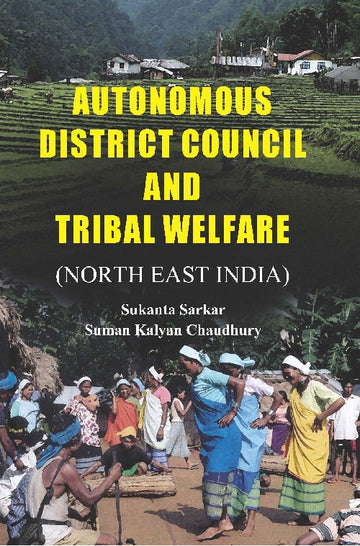Autonomous District Council and Tribal Welfare (North East India)
Regular price
₹ 907
Sale price
₹ 907
Regular price
₹ 975
Unit price
Save 7%
| Item Weight | 400 Grams |
| ISBN | 978-9351280439 |
| Author | Sukanta Sarkar, Suman Kalyan Chaudhury |
| Language | English |
| Publisher | Kalpaz Publications |
| Pages | 320 p |
| Book Type | Hardbound |
| Dimensions | 25 X 15 X 5 |
| Publishing year | 2014 |
| Edition | 1st |
| Return Policy | 5 days Return and Exchange |

Autonomous District Council and Tribal Welfare (North East India)
Product description
Shipping & Return
Offers & Coupons
About The Author:- Sukanta Sarkar (MA, Ph.D) is working as assistant professor (economic s ) , Faculty of Management Studies, ICFAI University, Agartala, Tripura. He did bachelor and master degree in economics. He was awarded Ph.D for this research work on rubber tappers in Tripura. He qualified UGC-NET Exam in December/2006. He presented many research papers in various seminars, conferences and symposiums. Various research papers have been published in foreign and national journals. He has authored books relating to Corruption, Human Trafficking, Orphan Children, Rubber plantation, Corporate social responsibility, Handicraft workers, Deforestation, Environmental pollution, Agrarian economics and Social security…. Suman Kalyan Chaudhury (M.Com, Ph.D) is a distinguished scholar in the field of Finance and Accounting and a dedicated researcher and teacher. His superior academic credentials have put him in a status as exemplary and a role model in management. He has published 40 research papers in different referred National and International journals and magazines. At present under his guidance 10 research scholar doing Ph.D in the area of Management and one scholar has awarded Ph.D. His excellence in methodology and competency in pedagogy is well accredited. He has innate curiosity and his passion for management and industry is unique in style. His experience in this vast field is unparallel. He has engaged number of students in cutting edge research. He has participated and presented 60 papers in various National and International conferences, seminars, symposia and workshops. His area of interest on research covers Financial Management, Accounting, Entrepreneurship, Micro Finance,.To his credit Dr. Chaudhury has 13 years of teaching experience, 3 years Industry experience along with 3 years research experience. Currently Dr. Chaudhury is working for Berhampaur University, Odisha as a Placement Officer, in P.G. Dept. of Business Administration. Contents:- CONTENTS:- # SECTION: A TRIBAL SITUATION AND WELFARE : Evolution and Functioning of the Sixth Schedule of the Constitution of India Jangkhongam Doungel Introduction • British Rule and Its Impact in the Hill Areas of the North-East India • Bordolai Committee and Acceptance of the Second Schedule by the Constituent Assembly • Amendment of the Sixth Schedule and Emergence of States and Union Territories from the Sixth Schedule Area • Uniqueness of the Pawi-regional Council • Amendment of the Sixth Schedule and its Present Status • Comparative Analysis of the Powers of Different Councils, and Conclusion. : Situation of Tribal’s in India: An Overview N.G. Pandse and Sukanta Sarkar Introduction • Constitutional Provisions • Tribal’s in North India—Punjab, Haryana, Himachal Pradesh, Uttar Pradesh, Uttarakhand, Jammu and Kashmir, Rajasthan • Tribal’s in East India-West Bengal, Bihar, Jharkhand, Orissa • Tribal’s in West India-Goa, Gujarat, Maharashtra, Daman and Diu • Tribal’s in Central India-Chhattisgarh, Madhya Pradesh • Tribal’s in South India-Pondicherry, Kerala, Karnataka, Andhra Pradesh, Tamil Nadu • Tribal’s in North-East India- Nagaland, Mizoram, Manipur, Tripura, Arunachal Pradesh, Foreword 11 Preface 13 Abbreviations 15 List of Contributors 19 Introduction: 6 Autonomous District Council and Tribal Welfare Assam • Tribal’s in Andaman and Nicobar Islands • Tribal’s in Lakshadweep Islands • Conclusion. : Traditional Thangkhal Marriage System S. Haukhanlian Mate Introduction • Marriage System: Arrange Marriage, Elopement, Marriage Proposal, Bride Price, Marriage Ceremony, Mouven Key (dowry), Tunsa, Sasengsin, Pusum, Tha-man, Sialkhumsa and Divorce. : The Socio-demography of the Tribal’s in North-East India P.K. Pandey Introduction • Tribal’s in Assam • Tribal’s in Meghalaya • Tribal’s in Manipur • Tribal’s in Nagaland • Tribal’s in Mizoram • Tribal’s in Sikkim • Tribal’s in Arunachal Pradesh • Tribal’s in Tripura • Conclusion. : Economic Problems and Prospects of Tribal Youth in Tripura: With Special Reference to Educated Unemployment L. Darlong Introduction • Situation of Tribal in Tripura • Economic Problem Faced by Educated Tribal Youth • Education and Unemployment • An Alternative Way of Educated Tribal Youth • Conclusion. : Tribal Life in India: Past vs Present Prahelika Roy Introduction • Who are Tribal’s • Situation of Tribal in India • Life of Tribal’s: Historical Perspectives • Changing Scenario of Tribal Life • Policy of Government • Conclusion. : Employment Avenues in Government and Corporate Sectors for Tribal People Turun Kumar Bahadur Introduction • Constitutional Status • Tribal’s in North East India • Demographic Profile of Scheduled Tribes in Assam—Work Participation Rate, Category of Workers, Government and Corporate Sector Job Opportunity for ST, Should there be Job Quotas in the Private: CONTENTS:- 7 : Social Security of Tribal’s in India: Needs and Government Initiatives Fazana Alim Introduction • Article 342 Scheduled Tribes • Importance • Constitutional Safeguards for the children • Special Central Assistance and Grants under Article 275 (1) of the Constitution • Tribal Welfare • The Tribal Policy: Focus on Formal Education • Sarva Shiksha Aviyan • Ashram Schools • Tribal sub-plan • Vocational Training in Tribal Areas • Schemes of Development of Primitive Tribal Groups • Tribal Research Institutions • Girls/Boys Hostels for STs • Strengthen Education among Scheduled Tribe Girls in Low Literacy District • Coaching for Scheduled Tribes • Grant-in-aid to Voluntary Organisations Working for Welfare of Scheduled Tribes • Post-matric Scholarship for Scheduled Tribes Students • Upgradation of Merit of ST Students • Rajiv Gandhi National Fellowship Scheme • National Overseas Scholarship Scheme for Scheduled Tribes • Scheme of Top Class Education for ST Students • Tribal Cooperative Marketing Development Federation of India Limited • PESA • Scheme for Assistance to State Tribal Development and Finance Corporations • State/UT Minor Forest Produce Act 2005, Development and Employment Programmes- National Rural Employment Guarantee Act, Sampoorna Grameen Rozgar Yojana, Swarnjayanti Gram Swarozgar Yojana, Indira Awas Yojana, National Rural Health Mission (2005-2012) • Tribal forest interface • Legal provisions in Scheduled areas • Five Year Plans and Tribal welfare • Reservation • Ministry of Tribal welfare • Conclusion. : Tribal Culture and Elementary Schooling of the Girls in the context of Odisha Subhash Chandra Panda Introduction • Similarities of culture among different sections of Tribal’s • Tribal literacy and Population growth • Maintenance of tribal family: The role of the female • Educational status of tribal’s • Teaching learning problems: 8 Autonomous District Council and Tribal Welfare of tribal girls • Suggestions for improvement of women education programme • Conclusion. 10. Tribal’s in Andaman and Nicobar Islands: An Overview Amitra Sudan Chakraborty Introduction • Andaman and Nicobar Islands • Great Andamanese tribe • Jarwa tribe • Sentinelese tribe • Onges tribe • Shompens tribe • Nicobarese • Tsunami • Supreme Court Judgement • Conclusion. 1: Tribal Labour Problems in India Rakesh A. Joshi and Falguni S. Vyas Introduction • Who are Tribal? • Problems faced by the Tribal labour • Tribal unrest • Suggestions for more improvement of Tribal Labour Conditions. SECTION: B AUTONOMOUS DISTRICT COUNCIL 1: Status of Autonomous District Council’s in India: An Overview D. Pulla Rao Introduction • Concept • Assam—Bodoland Territorial Council, Karbi Anglong Autonomous Council, Dima Hasao Autonomous District Council, Mishing Autonomous Council • Mizoram-Chakma Autonomous District Council, Lai Autonomous District Council, Mara Autonomous District Council • Tripura—Tripura Tribal Areas Autonomous District Council • Arunachal Pradesh • Manipur • Nagaland • Meghalaya-Garo Hills Autonomous District Council, Jaintia Hills Autonomous District Council, Khasi Hills Autonomous District Council • West Bengal- Gorkhaland Territorial Administration • Jammu and Kasmir- Ladakh Autonomous Hill Development Council, Kargil, Ladakh Autonomous Hill Development Council, Leh • De Facto Autonomous Area • Conclusion. 1: Management of Forest for Sustainable Development with Reference to Dima Hasao Autonomous District Council, Halflong, Assam Jamshad Ali Introduction • Legal status of forest in Dima Hasao Autonomous Council • Management of forest for sustainable : CONTENTS:- 9 development- Village Reserves, Vegetation profile- Tenure and rights, Protection of the environment, Consultation and participation process, Social impact assessment, Protection forests from illegal activities, Development of cottage industries, Urgent Needs • Conclusion. 1: Karbi Anglong Autonomous District Council in Assam: Historical Perspectives S.K. Chaudhury Introduction • Historical perspectives • Karbi People’s Liberation Tiger (KPLT) • Autonomous District Council • Karbi People • Functions and Power-Legislative powers, Expectative powers, Judicial powers • Significance • Conclusion. 1: Bodoland Territorial Council: Past Vs. Present B.K. Panda and Sukanta Sarkar Introduction • Bodo People • National Democratic Front of Bodoland • Bodo Liberation Tiger Force • All Bodo Students Union • Autonomous District Council • Bodo vs Bengali Violence. 1: Situation of Tribal’s and Economic Transition in Nagaland Dinesh Sarmah Introduction • The Tribal’s in Nagaland • Transition in the economy in Nagaland • Recent initiatives taken to revitalise the economy of the state based on local resources • Conclusion. 1: Autonomous District Council in Mizoram: Needs and Government Initiatives R. Prasad and Sukanta Sarkar Introduction • Historical Perspectives • Chakma Autonomous District Council • Lai Autonomous District Council • Mara Autonomous District Council • Mizo Society • Conclusion.: 10 Autonomous District Council and Tribal Welfare 1: Gorkhaland Territorial Administration: Conflict and Progress P.K. Pandey Introduction • Historical perspectives • Gorkha people • Autonomous district council • Progress • and Conclusion.: TTAADC in Tripura and Tribal Welfare: An Overview Satyajit Das Introduction • Historical background of TTAADC • TTAADC and Tribal welfare • Conclusion. Index. The Title 'Autonomous District Council and Tribal Welfare (North East India) written/authored/edited by Sukanta Sarkar, Suman Kalyan Chaudhury', published in the year 2014. The ISBN 9789351280439 is assigned to the Hardcover version of this title. This book has total of pp. 320 (Pages). The publisher of this title is Kalpaz Publications. This Book is in English. The subject of this book is Anthropology. Size of the book is 14.34 x 22.59 cms Vol:-
- Sabr– Your order is usually dispatched within 24 hours of placing the order.
- Raftaar– We offer express delivery, typically arriving in 2-5 days. Please keep your phone reachable.
- Sukoon– Easy returns and replacements within 5 days.
- Dastoor– COD and shipping charges may apply to certain items.
Use code FIRSTORDER to get 5% off your first order.
You can also Earn up to 10% Cashback with POP Coins and redeem it in your future orders.








